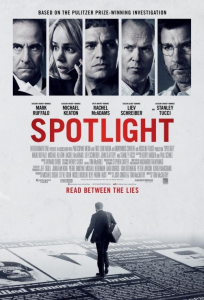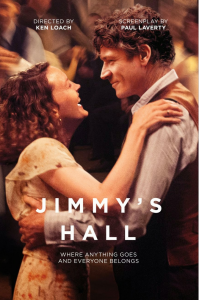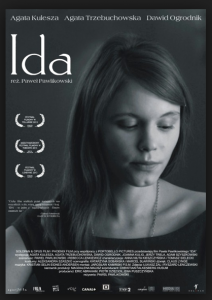November 19th, 2015 — 6:28am
 *****
*****
Spotlight-rm
Almost 40 years ago a film about investigative reporters who exposed the Watergate break-in and brought down the Nixon presidency was nominated for eight Academy Awards including best picture. That was All the President’s Men. Jason Robards, Jr. won for best supporting actor. Now today we have Spotlight, a terrific film about an investigative reporter team of the Boston Globe, who in 2002 dug into the hidden scandal of about 90 catholic priests who were molesting children. These horrific crimes were covered up and even when some of them were exposed, the priests were not prosecuted and would just be re-assigned to churches in other cities. The reporting team persisted in their work and even exposed the fact that Cardinal Law also knew about these activities and participated in the cover-up. This ultimately led to him being re-assigned to a posh position in a prominent church in Rome. This exposé rocked the Catholic Church and has implications that extend to the present time.
It will be very difficult to choose a best actor or supporting actor from these outstanding performances, since this was truly the work of an ensemble. The real life reporters, Mike Rezendes was played by Mark Ruffalo, Sacha Pfeiffer was played by Rachel McAdams, Matt Carroll was played by Brian d’Arcy and the Spotlight team team leader, Walter “Robby†Robinson was played by Michael Keaton. There also were great performances by Liev Schreiber as Marty Baron, the newly brought in overall senior editor of the Boston Globe who happened to be Jewish. John Slattery played Ben Bradlee, Jr. the long-time editor of the Boston Globe, who was a supervisor to the Spotlight Team. Interestingly, Ben Bradlee, Jr. is the son of the famed newspaper icon, Ben Bradlee who was the editor of the Washington Post during the Watergate scandal exposé. There were some other fine performances by familiar faces which included Stanley Tucci as one of the many lawyers in the film and Len Cariou (who plays the grandfather on Blue Bloods TV program) as Cardinal Law.
The director of this movie was Tom McCarthy who co-wrote the screenplay with Josh Singer. They made the decision not to collapse some of the characters in order to keep the team as the ensemble it was in real life. This may have somewhat diffused the potential drama of the movie. Early in the film, as each reporter went off on his and her own investigative aspects of the project, it was a little confusing as to who they were interviewing and why. This all came together as the two-hour and nine-minute film flew by with the tension mounting as the story progressed. We got the message that investigative reporting is hard, tedious work but when you see your subject in your “gun sight†and you realize you are dealing with a worthy subject, all the effort is worth it. The realism of the movie was also enhanced by some collaborative meetings by the actors with the real reporters. We understand that they held meetings with their respective characters and with some of them even watched how they performed in their workplace. The result is a movie that should not be missed or forgotten. (2015)
Comment » | 5 Stars, Drama, History
June 18th, 2015 — 6:22pm
***
Jimmy’s Hall – sp
This is a touching film made by veteran director, Ken Loach who is mostly known for his acclaimed work in Europe, with a screenplay by Paul Laverty. It deals with an important part of Irish history with which most Americans are not very familar. It is based on a real character, Jimmy Gralton (Barry Ward) who was an idealistic Irish leader whose main claim to fame, was running Jimmy’s Hall in an obscure Irish town, first in the 1920s and then 10 years later, in the 1930s. In this hall, (which was really a home or a cabin) men, women and children would gather to sing the popular music of the time and likewise do the popular dances, children would also sing and dance and learn history and some of the older boys would learn how to box. There would be lively discussions and a good time would be had by all. So what is wrong with this? Where is the conflict and where is the story? While we are not intimately familiar with Irish history and the film does not spell everything out to be crystal clear, we do know there was great turmoil in Ireland during this time period. In particular, the Catholic Church vividly depicted by Father Sheridan (Jim Norton) did not like the idea that people would dance and sing or even learn outside the auspices of the church. There was also a great economic and social upheaval notably between Ireland and Great Britain during this time as well as class warfare between the prosperous landowners and the workers. There was great dislike by many for socialism and of course for communism when that became an important issue. Jimmy was an idealist who spoke his mind which led to him being deported from Ireland without a trial or even any hearing. There is a sad love element as when Jimmy first returned, he is reunited with his old girlfriend, Oonagh (Simone Kirby) who is now happily married with children but still shares her simmering love for her old boyfriend. That is really the theme of the movie – so many unhappy people who are dealing with political and social issues which were much bigger than all of them. This is a well-done film but it never really breaks out. (2015)
Comment » | 3 Stars, Drama, Foreign, History
April 24th, 2014 — 7:16pm
 ***
***
Ida – sp We are pleased to report that for some unknown reason there are a number of readers of this blog who are from Poland. So we hope we will get some comments at the end of this review from them. This movie won The Eagle, which is the Polish equivalent of the American Oscar. It is in Polish with English subtitles. We understand it is also dubbed with the local language rather than using subtitles in many European countries, as it was in France, where is was a big hit. The setting is Poland in the 1960s. A young woman who is studying to be Nun in a convent is told by the Mother Superior that before she takes her vows she must go and meet her aunt, her only known family member (previously unknown to her) since she was brought to the convent as a baby during the war. She travels to the city where her aunt is located and finds out that she is Jewish. The two of them set off on a haunting road trip to find out what happened to her parents and where they are buried. The aunt, played by veteran Polish actress Aguta Lulesza, is tough as nails on the outside but has her own secret pain which is ripping her apart. Ida the novitiate, also known as Sister Anna Ida, and now with a last name Lebenstein, is played by a first time actress who was discovered in a coffee shop by the director. Her name is Agata Trzebuchowska. She is beautiful, and now burdened with a dilemma of what to do with her new insight into her origin. She also has to decide whether to go forward and take her vows, which of course includes chastity. It should be mentioned that on her road trip she does meet a handsome musician (David Ogrodnik) and we do detect some chemistry between them. The ambience of this film befits the subject matter. It is in black and white using a 4×3 format (almost square) with many close-ups. The locations are old bleak buildings, churches, a cemetery, and old roads with a lot of snow. The dialogue, although in Polish with subs, is sparse. There is a Polish 60s musical background that is mostly ambient rather than with a soundtrack. There are reminders of the role of communist rule in post war Poland. Everything is not spelled out for the viewer but there is little doubt about the story and the internal pain that our characters are feeling. It will awaken feelings about atrocities in WW II, which are still not far from the surface in many people, some now two generations removed from it. Although director and screenwriter Pawel Pawlikowski in a post film discussion said he had no doubt about how this 80 minutes film should end, there is another point of view on this subject. Finally, this movie is one of many films that have a theme which shows the immense struggle that people have to connect with a biological parent or vice versa. A discussion and summary of this issue can be found at http://www.psychiatrytalk.com/2014/04/the-search-for-a-persons-biological-identity/ (2014)
Comment » | 3 Stars, Drama, Foreign
December 1st, 2013 — 10:03pm
****
Philomena -  Early in the film we learn that Martin Sixsmith (Steven Coogan), a former journalist, has lost his job as a Labor government (British) advisor and decided to meet Philomena ( Judy Dench) an elderly woman who as a teenager had an out of wedlock child at a convent and saw that child taken away for adoption. In her later years she unsuccessfully tried to find out what happened to him and never stopped thinking about him even after she became a mother and grandmother. She agrees to let Sixsmith help her try to find her, long lost but never forgotten, son and write a human interest story about this situation. Â
Early in the film we learn that Martin Sixsmith (Steven Coogan), a former journalist, has lost his job as a Labor government (British) advisor and decided to meet Philomena ( Judy Dench) an elderly woman who as a teenager had an out of wedlock child at a convent and saw that child taken away for adoption. In her later years she unsuccessfully tried to find out what happened to him and never stopped thinking about him even after she became a mother and grandmother. She agrees to let Sixsmith help her try to find her, long lost but never forgotten, son and write a human interest story about this situation. Â
The film is based on a non-fiction book The Lost Child of Philomena Lee by the real Sixsmith which documents the journey of this unlikely pair. This movie about this human trauma was directed by Stephen Frears with a screenplay by lead actor Coogan and Jeff Pope. It takes a hard look at the attitude of the Catholic Church towards unwed mothers (at least in Ireland 50 years ago but which may not have completely changed today.) It pulls no punches in showing the cruel treatment of the unwed mothers who had to work in oppressive conditions for a few years in return for having had their child delivered and cared for by the nuns in the convent, only to see their little one sold to rich Americans who were looking to adopt a child. The details of the destiny of the children were hidden from the mothers and attempts to later trace them were covered up with lies and deception. There is an attempt at some balance by showing the contrasting lack of religious faith by the journalist compared to the almost all forgiving faith of Philomena but in the end the Church does not look very good.
The movie also reminds us of the painful discrimination towards people with HIV disease which existed in the United States, especially in the 1980s. Both Coogan and Dench are excellent as they convey their subtle emotions and the grand lady of theatre and film may be up for another of her many awards. The storyline of this film also deals with a psychological topic that one of us (MB) has been interested in from a clinical point of view as well as how it has been depicted in various movies. Lost or hidden family members is the subject and the incessant drive to find that person where the emotional connection is intensely built on the biological connection even when the life experience together has been very little or even absent. Some of the recent movies which we have reviewed on this subject have been The Kids Are All Right, People Like Us, Stories We Tell, Admissions  and Mother and Child. MB has also written about this with case examples in a blog titled PsychiatryTalk.com which you can click here to view. This very fine film is not only another example of this phenomena but also stands on it’s own as a compelling dramatic production, (2013)
1 comment » | 4 Stars, Drama
October 13th, 2013 — 7:46pm
***
Don Jon- rm – Joseph Gordon-Levitt, a writer, director and lead actor takes on a complicated and difficult subject and that is relationships and sexuality. He also takes a swipe at the Catholic Church and what some might say is the stereotype of New Jersey women and men. Don Jon (certainly a name to remind us of the great lover Don Juan), played by Levitt is a 30 something guy living a single life in New Jersey. He lives near his parents (Tony Danza and Glenne Headley) and is a working guy like his dad. He has a bachelor pad where he enjoys sex with his latest girlfriend. However, he enjoys watching pornography on his computer even more. Ms. Sugaraman (Scarlett Johansson), his new girlfriend is a knockout but she has definite ideas what a man should be like and thus tries to set the bar for Don Jon. This includes, going back to school, having a maid clean his apartment rather than himself (which Don would rather do), spend time with her and her friends together and most of all enjoy seeing romantic movies with her. Don tries to do all of this but still goes back to his Porn. All the Hail Mary’s ordered by his Priest after his Confession don’t help. He meets a slightly older widow (Julianne Moore) who shows him that sex and lovemaking can even be better than porn when the two people are really into each other. Levitt makes his points with good writing and great acting (especially his and Johansson’s). However, it isn’t clear to us if he is talking about the current state of sexuality in today’s society or if he is making a statement about the coming of age of his generation or both. In either case, he made a bold creative movie that may be able stand on it’s own. We suspect that Mr. Levitt who has established himself as an actor will be on the scene as a filmmaker for some exciting new movies. Perhaps we are seeing the the new Woody Allen. (2013)
Comment » | 3 Stars, Comedy, Romance








